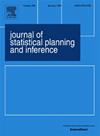张量值数据分析中的结构化正则化协方差估计
IF 0.8
4区 数学
Q3 STATISTICS & PROBABILITY
引用次数: 0
摘要
协方差估计在高维数据分析中提出了一个至关重要的挑战,特别是当传统方法(例如样本协方差)不准确时,特别是在小样本量的情况下。一个有希望的解决方案是利用固有的数据结构,如低秩、稀疏性或平滑性。对于张量数据(多维数组),结构化正则化有助于降维。介绍了一种新的正则化方法用于张量协方差估计,特别是对协方差矩阵应用带状结构和锥形结构。我们使用Kronecker积正则多进分解(KPCP)通过较小矩阵的Kronecker积来近似大矩阵。采用分割重采样的方法从噪声数据中选择KPCP分解的参数。这导致了两种方法:kcpp - tb - r(三重带重采样)和kcpp - tt - r(三重锥形重采样)。此外,还介绍了稀疏(阈值)和多结构正则化方法进行比较。通过大量的模拟和月度出口贸易量数据验证了所提出方法的有效性和鲁棒性。本文章由计算机程序翻译,如有差异,请以英文原文为准。
Structured regularization covariance estimation in tensor-valued data analysis
Covariance estimation poses a crucial challenge in high-dimensional data analysis, especially when traditional methods (e.g., sample covariance) are inaccurate, particularly with small sample sizes. A promising solution is to exploit inherent data structures such as low-rankness, sparsity, or smoothness. For tensor data (multi-dimensional arrays), structured regularization aids in dimensionality reduction. This paper introduces novel regularization methods for tensor covariance estimation, specifically applying banded and tapering structures to the covariance matrix. We use Kronecker Product Canonical Polyadic (KPCP) decomposition to approximate large matrices via the Kronecker product of smaller matrices. A split resampling scheme is employed to select parameters for the KPCP decomposition from noisy data. This leads to two methods: KPCP-TB-R (Triply Banded-Resampling) and KPCP-TT-R (Triply Tapering-Resampling). Additionally, sparse (thresholding) and multi-structured regularization approaches are introduced for comparison. The effectiveness and robustness of the proposed methods are validated through extensive simulations and applied to monthly export trade volume data.
求助全文
通过发布文献求助,成功后即可免费获取论文全文。
去求助
来源期刊
CiteScore
2.10
自引率
11.10%
发文量
78
审稿时长
3-6 weeks
期刊介绍:
The Journal of Statistical Planning and Inference offers itself as a multifaceted and all-inclusive bridge between classical aspects of statistics and probability, and the emerging interdisciplinary aspects that have a potential of revolutionizing the subject. While we maintain our traditional strength in statistical inference, design, classical probability, and large sample methods, we also have a far more inclusive and broadened scope to keep up with the new problems that confront us as statisticians, mathematicians, and scientists.
We publish high quality articles in all branches of statistics, probability, discrete mathematics, machine learning, and bioinformatics. We also especially welcome well written and up to date review articles on fundamental themes of statistics, probability, machine learning, and general biostatistics. Thoughtful letters to the editors, interesting problems in need of a solution, and short notes carrying an element of elegance or beauty are equally welcome.

 求助内容:
求助内容: 应助结果提醒方式:
应助结果提醒方式:


